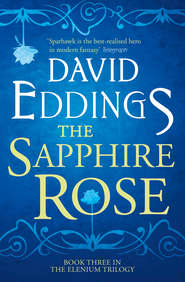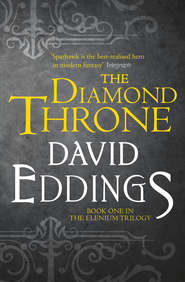По всем вопросам обращайтесь на: info@litportal.ru
(©) 2003-2025.
✖
The Treasured One
Автор
Год написания книги
2019
Настройки чтения
Размер шрифта
Высота строк
Поля
‘You’re an absolute genius, Omago!’
‘I wouldn’t go that far, Keselo,’ Omago replied, feeling slightly embarrassed by the young Trogite’s enthusiasm. ‘As I see it, this phalanx thing your commander mentioned is going to take quite a bit of practice to get used to.’
Keselo nodded. ‘Several weeks at least,’ he agreed. ‘Now, when we take up the phalanx formation we overlap our shields to put a solid wall to the front. Then we tuck the butt of the spear under our right armpit and take hold of the shaft with our right hand. You have to hold the shield bar tightly with your left hand and the shaft of your spear just as tight with your right. The muscles in both your arms will be a little sore by the end of the day at first, but that’ll go away after a while. The secret of the whole thing is that your soldiers aren’t working as individuals. They’re a unit, and they’re very closely coordinated. When you use the phalanx formation, your men have to lock their spears in place and then walk forward in unison. They walk the spear-point into the enemy instead of jabbing or poking.’
‘That might take a bit of getting used to,’ Omago said a bit dubiously.
‘Yes, it does. We’ll start by teaching your men to march. That involves walking in unison. We want everybody’s left foot to come down on the ground at the same time. After a while, it gets to be second nature, and they’ll be able to do it in their sleep – well, almost.’
‘Being a soldier’s a little more complicated than I thought it might be,’ Omago observed.
‘It beats doing honest work,’ Keselo replied with a slight grin.
‘My ships are a lot faster than yours, Narasan,’ Sorgan Hook-Beak said that evening at the supper table. ‘I’ll be able to bring Lady Zelana’s archers here in about half the time it’d take those scows of yours.’
‘And only bring back half as many,’ Narasan added dryly. ‘We could probably argue all night about which would be better – fast or many.’
‘You’ve got a very warped sense of humor, Narasan.’
‘Nobody’s perfect,’ Narasan replied blandly.
‘Just exactly where’s the border-line between your Domain and Zelana’s, Veltan?’ Longbow asked.
‘I don’t know if I’d call it a line, exactly,’ Veltan replied. ‘Why do you ask?’
‘Most archers are hunters, and hunters can run quite a bit faster than people who spend their time sitting in one place. Any ship – either Sorgan’s or Narasan’s – will have to take the long way around to get back to Lattash. The archers could come across country, though, and if I remember your lumpy picture correctly, a straight line from Lattash to your house here would be less than half as far as a ship would have to travel.’ He looked at Sorgan with a faint smile. ‘We could race, if you’d like, and maybe even make some kind of wager on it.’
‘I think I’ll put my money on Longbow, Sorgan,’ Narasan declared.
‘Not against me, you won’t,’ Sorgan said sourly. ‘The main thing I’ve learned about Longbow is never to try to beat him – at anything.’
The following morning a balding Trogite named Gunda came up from the beach to confer with Commander Narasan. ‘I had a clerk draw a copy of my map for Andar,’ he reported, ‘and he’ll bring the rest of the army on up through that channel through the ice. Then I bought a sloop so that I could come up here and find out exactly where we want the army to come ashore. Then I’ll go on back down to the upper end of the channel and lead Andar on up here.’
‘How long is it likely to take, Gunda?’ Narasan asked.
‘Probably about another two weeks. Have things started to heat up here yet?’
‘Not as far as we know,’ Narasan replied. ‘Of course, when you’re dealing with those snake-men, you can never be sure. Why didn’t you bring Padan up here with you?’
‘Well, he’s just a little bit nervous, Commander,’ Gunda replied. ‘When he gets here, he’s going to have to report a couple of things that aren’t going to make you any too happy.’
‘Such as?’
‘Could I take that as an order, sir?’ Gunda asked. ‘I wouldn’t want Padan to start calling me a snitch.’
‘Consider it to be an order then, Gunda. What’s been going on down there at the beach?’
‘Well, sir, when Padan woke up yesterday morning, he noticed right off that Veltan’s sloop wasn’t there any more.’
‘You said what?’ Veltan demanded.
‘It’s gone,’ Gunda replied, ‘but this gets even better. Padan told me that Commander Narasan had stripped Jalkan of his commission and had him put in chains. After a while, Padan put a couple of things together and he ran down to the little room in the hold of the ship where Jalkan had been chained to the wall – and guess what? Jalkan wasn’t there any more either. I suppose it might just be a coincidence that the sloop and Jalkan both vanished on the same night, but I don’t think I’d want to wager a month’s pay on it.’
‘Are you just about through joking around, Gunda?’ Narasan demanded.
‘I was just reporting what had happened, sir. If I remember correctly, you did order me to tell you about this, and a good soldier always obeys orders.’ He feigned a look of wide-eyed innocence.
And then he burst out laughing.
Upon reflection, Omago realized that the outlanders were quite a bit more advanced than the people of the Land of Dhrall, but their social structure left much to be desired. They were very much like children – except that they all carried deadly weapons, and they’d go to war on almost any pretext.
That childish aggressiveness did work to the advantage of the people of the Land of Dhrall, though. The current situation required many hired killers, and it appeared that Veltan and his sister had found exactly the ones best qualified to meet the servants of the Vlagh.
Omago smiled faintly. The outlanders had all appeared to be astonished by several of the innovations he’d suggested. Evidently they all had the notion of ‘primitive savages’ locked in stone in their minds. The possibility that anybody in the Land of Dhrall could come up with improvements in weaponry was beyond their comprehension.
To some degree, perhaps, that blank spot in the minds of the outlanders could have grown out of their lack of awareness – or interest – in the extensive education Omago had received from Veltan since his early childhood. He was fairly sure that no outlander from the Trogite Empire or the Land of Maag had ever had a god for his teacher. The ‘connections’ which had come to Omago had been second nature, actually. Omago habitually moved from ‘effect’ to ‘cause’, and that seemed to be unnatural for the outlanders. They always seemed to think in the opposite direction. Evidently it had never occurred to them that the source of most inventions was ‘I need something that will do that,’ not ‘I wonder what I’ll be able to do with this thing if I make it.’
Omago was forced to concede that he had made a serious blunder, however. Jalkan’s insult had been a perfect opportunity to eliminate what might well turn out to be a serious danger down the line. ‘I should have killed him right there on the spot,’ Omago muttered regretfully. ‘Narasan even went so far as to offer me the opportunity, and I passed it up – probably because I didn’t want to offend the Trogites. I’m almost certain that we haven’t seen the last of that foul-mouthed lecher.’
Then a peculiar notion came to him. Could it be that Ara had deliberately instilled that lust in Jalkan? Omago was almost positive that she could have done that. She’d certainly done it to him when they’d first met in his orchard. Just the sight of her had made him her captive. If she had, in fact, set Jalkan’s mind to moving in that direction, it was quite obvious what she’d been after. Omago cursed himself. He’d failed her. She’d almost certainly have wanted him to respond in the most primitive way – bashing Jalkan’s brains out or ripping him up the middle with that iron knife.
‘If that’s what she really wanted, I wish she’d told me what she had in mind.’ He shrugged. ‘Ah, well,’ he sighed. ‘Maybe next time.’
THE BETRAYAL (#ulink_353ff6ea-05bc-5506-bc1b-bb879ca84fef)
1 (#ulink_52c7b304-0a7e-5c3f-9dda-c77e2cd7c3ed)
Jalkan of Kaldacin was the sole remaining member of a once-prominent family of the Trogite Empire. Many of his ancestors had served with honor and distinction in the Palvanum, and others had been advisors to historically significant emperors. The family had accumulated wealth, prestige and power over the years, and the names of several members were prominently displayed on various public monuments.
In the past century, however, Jalkan’s family had gone into a steep decline. Various ne’er-do-wells had squandered away the family’s wealth in wanton debauchery, gambling and drinking to excess. Moneylenders pursued them, and a fair number of Jalkan’s recent ancestors had spent their final years in assorted debtors’ prisons.
By the time Jalkan himself reached maturity, the family’s reputation had been irrevocably tarnished, and there were very few career opportunities available to him.
He considered the possibility of joining the ranks of the assorted Trogite syndicates that were currently amassing vast fortunes in the Land of Shaan. The notion of swindling ignorant savages out of their gold had a certain appeal, but he quickly discarded that idea when word of a colossal disaster reached Kaldacin. Evidently some idiot, far gone in drink, had boasted about his success in the wrong place and in front of the wrong people, and the natives of the Land of Shaan had gone on a rampage, slaughtering (and feasting on) every Trogite they could lay their hands on.
Jalkan, now facing the prospect of hard, honest work for scant pay, turned instead to the last refuge of the scoundrel. Dressed in his most sober clothing and wearing a someberly pious expression, he began to attend holy services in the local Amarite convenium three or four times a day.
In due time, one of the minor Hieras in the hallowed convenium noticed Jalkan and brought him to the attention of the Oran as a potential member of the clergy. The Oran interviewed Jalkan and enrolled him as a novice, demanding scarcely more than a third of Jalkan’s very limited remaining assets as a sign of good faith.
Jalkan winced, but finally agreed.
His first few months as a very junior member of the clergy were moderately unpleasant, since the Amarite hierarchy devoted much effort to weeding out apprentices who were excessively unworthy. Jalkan was clever enough not to steal too much and to discredit those of his fellow novices who were overly honest or obviously more clever than he was.
His cunning was noted by his superiors, and it generally met with their approval.
Jalkan’s most immediate goal as a novice had been to take the next step up to the rank of Hiera. A Hiera in the Amarite faith was not required to do much hard labor, and he was even assigned his own room. The rooms of the Hieras were called ‘cells’, and they were very tiny, but they were far better than the rank-smelling first-floor dormitories where the novices were crammed together like cattle.
Because he was marginally literate, Jalkan’s duties as a Hiera were largely limited to administration, and he was somewhat startled to discover that nearly half of the Empire belonged to the Amarite church. The vast church estates produced much of the Empire’s food – for a handsome price – and the annual rent on various buildings in the capital city of Kaldacin brought in staggering amounts of money.











